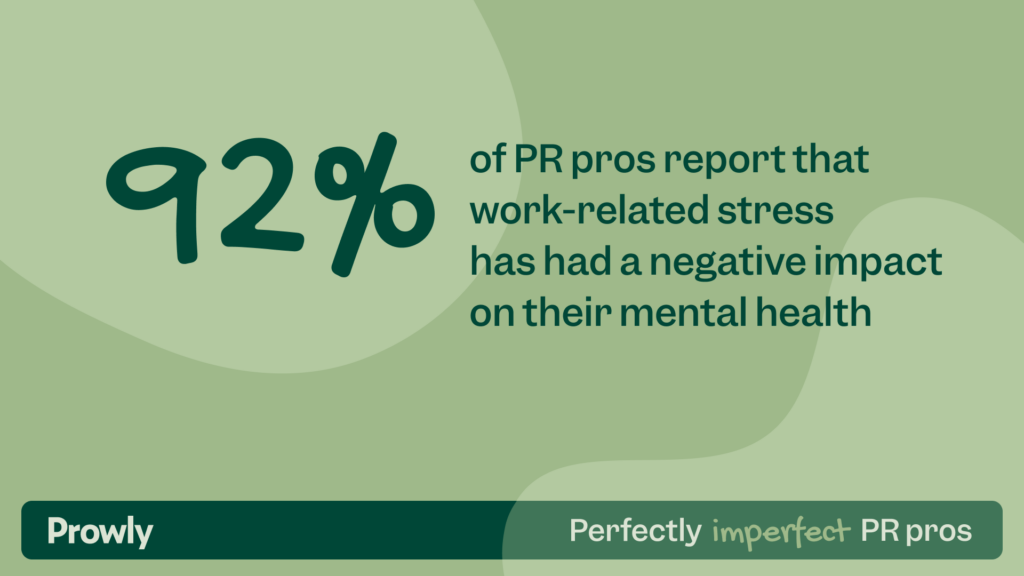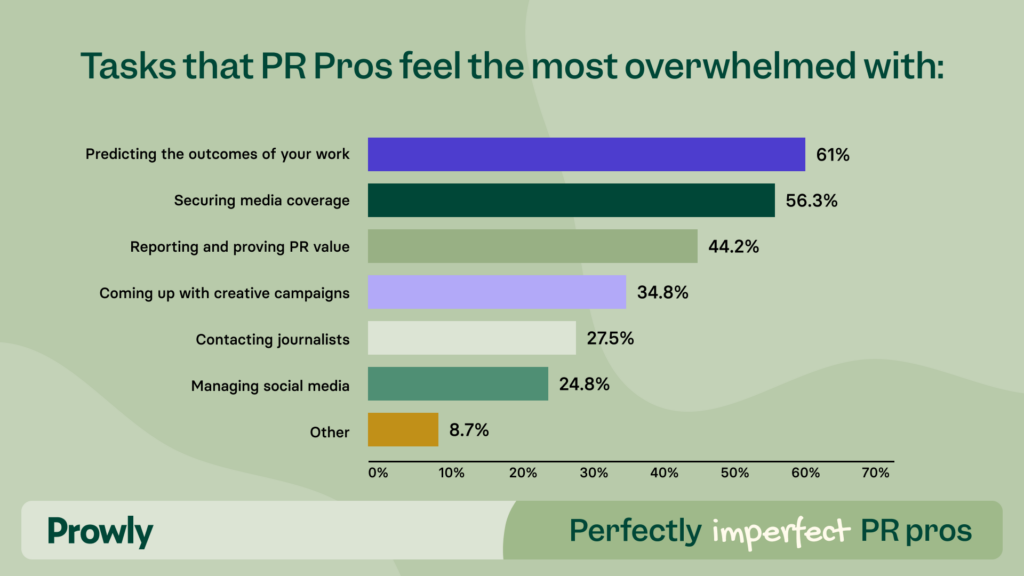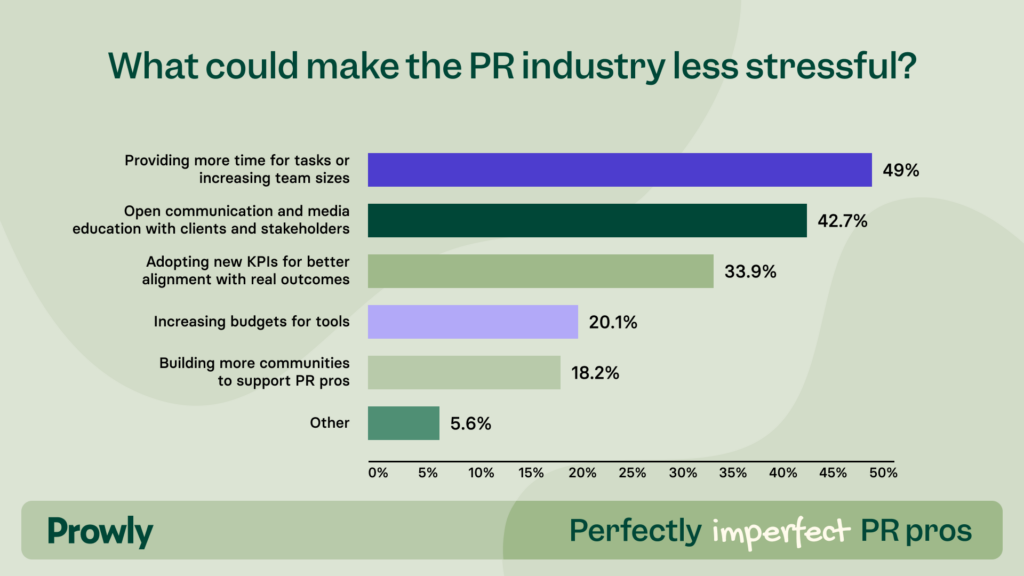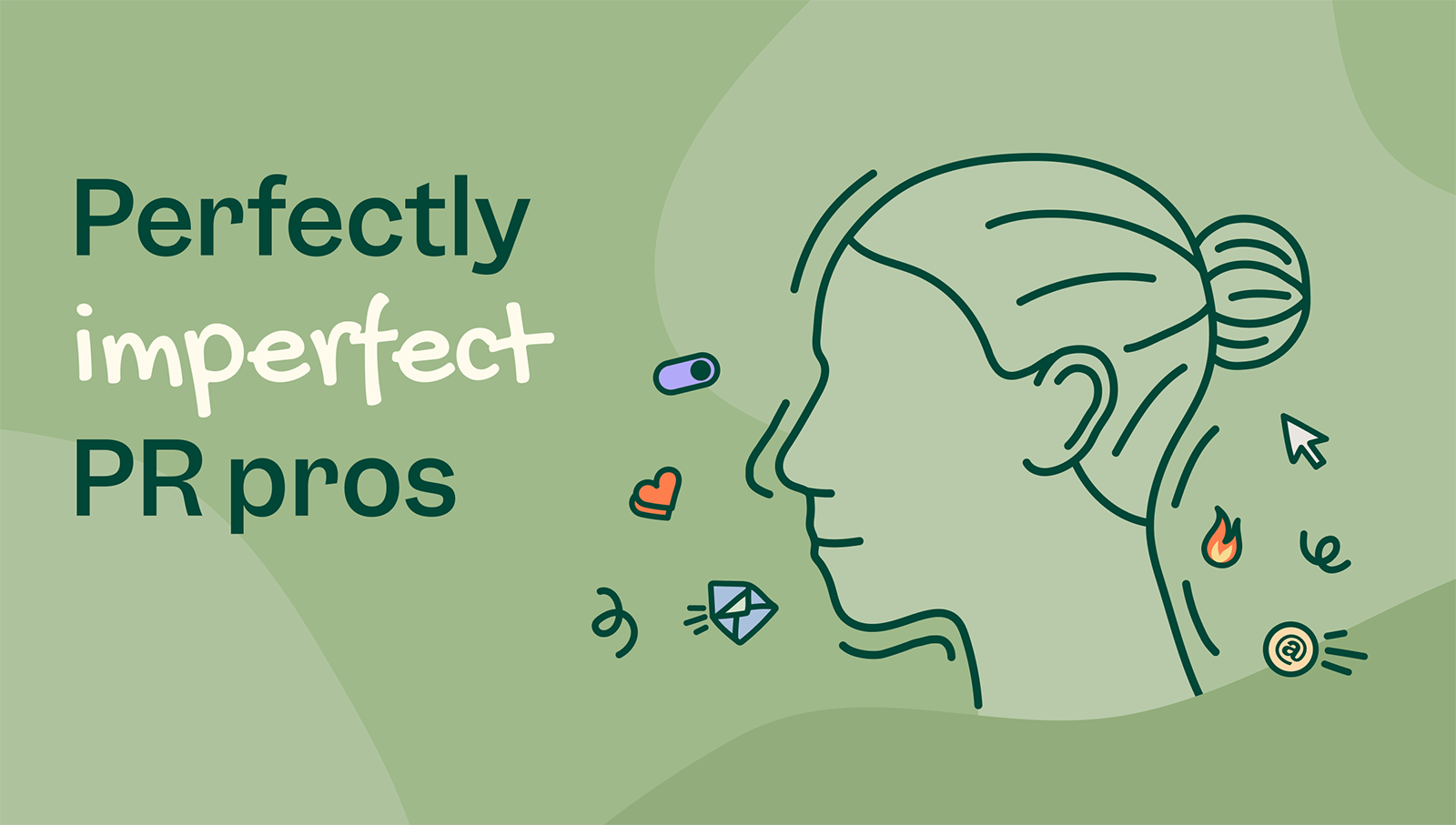Our recent survey focused on understanding stress levels among PR professionals. It provided us with valuable insights into the industry’s challenges that might affect our mental health and well-being. With close to 200 respondents, half of them were agency employees, followed by in-house positions and consultants. This activity is a part of the 2nd edition of our Perfectly Imperfect PR Pros campaign.
The findings were suspected but still shocking: 92% of respondents reported that work-related stress has wreaked havoc on their mental health. They’ve said the stress sometimes infiltrates every aspect of their life and affects not only their emotional and psychological health but also takes a toll on them physically.
“Working in the field of communications is both rewarding and challenging. On the positive side, it's engaging, rarely boring, and often financially rewarding … On the negative side, it's demanding, the news cycle is 24/7 so there are rarely any breaks, and much of what PR pros are trying to achieve is outside of their complete control. All of these aspects can lead to burnout, difficulty sleeping, higher blood pressure, etc. I have experienced all of these negative aspects” - Tricia Payer, Sr. Director of Executive Communications for Microsoft.
Feelings of loneliness, anxiety, and burnout. Those were the most common comments we’ve received, which make it nearly impossible for PR specialists to disconnect from work and have a work-life balance. The physical toll is equally harrowing, with numerous professionals suffering from sleep disturbances, stress-related illnesses, and chronic pain including headaches, stomach aches, and back pain. Need more?
57% of respondents experience stress-related symptoms either daily or very often.
We’ve compiled all the key information from this survey for you so that you can read more about the stressors others face in PR and practical solutions based on other professionals in the field on how to mitigate these challenges. Because after all, there’s more to life than a job – and our mental health and overall well-being are the most important.

Things PRs stress about the most (and what to do about it)
It’s a high-pressure world we live in, and for anyone who has a job in public relations, stress is a constant companion. Read on to find out what takes the biggest toll on PRs health, and what solutions you might want to implement to take care of your well-being better.

1. Predicting work outcomes
An overwhelming 61.2% of respondents said predicting outcomes was the most stressful part of their job. This isn’t surprising, considering how little control we have over the many external factors that can make it unpredictable to control the public’s perception and most importantly of all, media coverage. That uncertainty makes it really tough for anyone who works in PR to assess the impact of their work, especially when stakeholders or clients are demanding concrete answers.
→ Solution: To overcome this issue, start by focusing on what’s controllable. It sounds stupid simple, but it helps. Make a list of what you can and can’t control, and just make sure you’ve done everything that’s possible on your part. Set aside some time for reflection as well: think about what you could have done differently (realistically!), and what was without any doubt truly unpredictable. This will help you “visualize” the area of control you have. Also, don’t forget about forecasting tools, and upskilling your data game. Both can make a big difference in showing a concrete strategy that works.
"Managing client expectations, delegating tasks, and having daily to-do lists with a dedicated mindset that most items on it must be completed are other major keys to keeping stress levels moderate while working in PR. However, being used to tight and short deadlines for media interviews, PR campaign launches, and events is just a part of the business. If someone can't deal with that, it is best to be self-aware, understand this, and perhaps pivot to another industry" - Samantha Savory, CEO and Founder of Savory-PR.
2. Securing media coverage
Getting that mention was chosen as a significant stress factor by 57% of the respondents. This comes as no surprise, given the competitive nature of media attention and the constantly new ways PRs need to come up with to break through all the noise. Additionally, if you’re working with clients or stakeholders who don’t understand how public relations work, and expect to get the best of the best on a tiny budget, this can take an additional toll on your mental health.
→ Solution: To address this, try something called cognitive restructuring. It sounds complicated, but it isn’t. Sit down and identify all the challenging negative thoughts, and replace them with positive, realistic ones. Allow yourself to give up the “black and white” thinking scheme, and instead of telling yourself things like “If I don’t get that coverage, I’ve failed”, reframe it to “This is just one opportunity, and there’s many more out there”. Such a shift in your mindset can help you reduce stress and improve your approach to securing media coverage.
"On many occasions throughout my career, I have worked nearly 24/7 for days at a time and managed communication in extremely sensitive situations, including individual safety, loss of life, and substantial operational disruptions. Early in my career, these incidents would burn me out mentally and emotionally, impacting my personal relationships and overall mental health.
Over time, I developed skills to help manage stress and maintain more emotional distance from work. The first step (as with many things in life) was just acknowledging that it was affecting me—that I wasn't emotionally invincible.
I picked up hobbies that took me away from my email (kayaking, for example), adopted a dog, started regular and consistent talk therapy, and began meditating daily. Not one of these things was a magic bullet fix, but combined with other self-care practices, they collectively created "safe spaces" for me to decompress" - Jessica Whidt, Managing Director at Warner Communications.
3. Reporting and proving work value
Demonstrating the value of PR activities was identified as a major source of stress by 45% of respondents. To put this in perspective, half of those who work in PR claim proving their value is a stress factor, which is a huge red flag for the industry in general. This highlights the need for clear metrics and effective communication about the PR ROI and is impact on business goals.
→ Solution: To tackle this, focus on open communication and educating your clients and stakeholders on media relations. How it works, what it is, and what it’s not before you start a project. Then, together, you can shift to more meaningful KPIs that align PR activities with the desire outcomes. It will help you reduce the pressure to meet metrics that don’t reflect any value and barely make sense.
"Personally, I've experienced burnout and stress that have led me to not be fully present in my personal life. Having someone in your life you can turn to and talk to is helpful, but zooming out and identifying areas to streamline your workflows so that you don't always feel the need to keep it all in your head is a saving grace.
I recently implemented a slew of improved systems and processes for documenting, tracking, and reporting on all of our PR firm's efforts, and it's done wonders for my mental health and stress levels" - Mike Mejer, Founder and CEO at Green Lane Communication.
4. Coming up with creative campaigns
There’s not one person in the world that runs on creativity juices 24/7. Nearly 35% of survey respondents said coming up with innovative ideas for campaigns was a factor contributing to work-related stress. Time pressure can stifle inspiration, and having to be creative on demand puts a lot of pressure on PR professionals. Combine that with all the other tasks you need to do, and you’ve got yourself a stress bomb in the making.
→ Solution: Encourage collaborative creativity by setting up team brainstorming sessions to make it all a shared effort. This approach reduces the burden of doing things individually, with no outside help. What’s more, it not only sparks ideas but also helps ease the stress of having to come up with creative solutions all on your own.
5. Contacting journalists
Make no mistake, this isn’t even about being an extrovert or having more stress tolerance than others. 27.2% of respondents said that reaching out to journalists is a significant stressor in the PR industry, especially when faced with tight deadlines and the ongoing pressure to secure media coverage. The fact that journalists’ responses are often unpredictable, critical, or dismissive doesn’t help either.
→ Solution: To better deal with this, it’s important to recognize that negative responses or rejections are never direct reflections of your value or competence. Basically, it’s not you – it’s them. Try shifting your mindset and viewing those interactions as opportunities to better understand journalists’ needs, their wants, and what expectations they have. It’s a mindset shift, but with a bit more thought, you can practice self-compassion this way and making sure you’re setting up realistic expectations for yourself.
6. Managing social media channels
Working in PR means becoming the Jack (or Jill!) of all trades. Since public relations has been meshing with marketing even more, there’s an additional stressor put on us to manage social media and 25.1% of respondents say it adds to their daily stress load. The constant monitoring and quick responses create a persistent sense of urgency, especially since social media never sleeps. The scrutiny, negative feedback, cancel culture, and everything else – it’s a lot to take on. Let’s not even talk about ever-changing algorithms.
→ Solution: Hands down, automation. Use tools that will help you schedule posts, manage social media, and alert you when there’s a critical mention you need to take care of. This will greatly reduce the need for constant monitoring, and help you effectively delegate tasks, making it easier to share the workload.
What needs to change in the PR industry?

- More time or increasing teams: working overtime and doing the job of 5 people can take a toll on just about anyone. Nearly half of all the respondents said employing more specialists, and more budgets for freelancers would make their job less stressful.
- Open communication and media education: there’s nothing worse than working with people who have no idea how public relations work and expect the same outcomes as you would get with paid advertisements. 43.3% of people said this is a core factor for making a change in the PR work environment.
"All PR roles are difficult—at least all the jobs I've had have been. But, when I've worked with peers, colleagues, managers, or stakeholders where there's mutual respect and trust, I've had a great experience. Without mutual respect and trust, it has been terribly destructive to my mental and physical health" - Tricia Payer, Sr. Director of Executive Communications for Microsoft.
- Setting realistic KPIs: there’s the ever-dreaded AVE, but sometimes, there’s nothing else to use. The nature of public relations makes it difficult to assess what goals are realistic, and which ones aren’t. Well, over 34% of survey respondents think so as well.
- A budget for tools: let’s face it, Excel can only take us so far. If clients and stakeholders want promising results, they need to spend money on PR tools that will help us automate what can be automated, and focus on creativity (as opposed to repetitive tasks).
"I have successfully run my PR agency for over 10 years now. I have a system of tools and checklists to ensure I am effectively and proactively managing my mental health and disorders in the best possible way. Minimizing unnecessary stress as a business owner and a publicist is key" - Samantha Savory, CEO and Founder of Savory-PR.
- More industry communities: nearly every fifth respondent said that more PR communities would help them alleviate some stress. Asking questions, getting answers, not being judged, and helping one another.
- Other responses worth mentioning include:
- Encouraging media outlets to respond to pitches quicker
- Outsourcing tasks such as bookkeeping or accounting
- Valuing the expertise of PR professionals more
- Making sure leadership is trained to support PR activities
- Improving the compensation model to better reflect the value and efforts
What’s next?
The results of our survey highlight the intense pressures that PR professionals face on a daily basis. From securing media coverage to proving the value of their work, stress is present in all aspects of their work.
What we need to do, collectively as an industry is keep on advocating for better solutions to ensure our well-being is taken care of. One thing is clear for sure – public relations must absolutely prioritize the mental health of the people who work in it so that we can have a more balanced and fulfilling career in PR.

